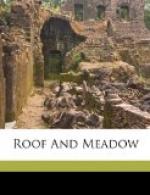Much more numerous than the swallows are the night-hawks. My roof, in fact, is the best place I have ever found to study their feeding habits. These that flit through my smoky dusk may not make city nests, though the finding of such nests would not surprise me. Of course a night-hawk’s nest, here or anywhere else, would surprise me; for like her cousin, the whippoorwill, she never builds a nest, but stops in the grass, the gravel, the leaves, or on a bare rock, deposits her eggs without even scratching aside the sticks and stones that may share the bed, and in three days is brooding them—brooding the stones too.
It is likely that some of my hawks nest on the buildings in the neighborhood. Night-hawks’ eggs have occasionally been found among the pebbles of city roofs. The high, flat house-tops are so quiet and remote, so far away from the noisy life in the narrow streets below, that the birds make their nests here as if in a world apart. The twelve-and fifteen-story buildings are as so many deserted mountain heads to them.
None of the birds build on my roof, however. But from early spring they haunt the region so constantly that their families, if they have families at all, must be somewhere in the vicinity. Should I see them like this about a field or thicket in the country it would certainly mean a nest.
The sparrows themselves do not seem more at home here than do these night-hawks. One evening, after a sultry July day, a wild wind-storm burst over the city. The sun was low, glaring through a narrow rift between the hill-crests and the clouds that spread green and heavy across the sky. I could see the lower fringes of the clouds working and writhing in the wind, but not a sound or a breath was in the air about me. Around me over my roof flew the night-hawks. They were crying peevishly and skimming close to the chimneys, not rising, as usual, to any height.
Suddenly the storm broke. The rain fell as if something had given way overhead. The wind tore across the stubble of roofs and spires; and through the wind, the rain, and the rolling clouds shot a weird, yellow-green sunlight.
I had never seen a storm like it. Nor had the night-hawks. They seemed to be terrified, and left the sky immediately. One of them, alighting on the roof across the street, and creeping into the lee of a chimney, huddled there in sight of me until the wind was spent and a natural sunlight flooded the world of roofs and domes and spires.
Then they were all awing once more, hawking for supper. Along with the hawking they got in a great deal of play, doing their tumbling and cloud-coasting over the roofs just as they do above the fields.
Mounting by easy stages of half a dozen rapid strokes, catching flies by the way, and crying peent-peent, the acrobat climbs until I look a mere lump on the roof; then ceasing his whimpering peent, he turns on bowed wings and falls—shoots roofward with fearful speed. The chimneys! Quick!




